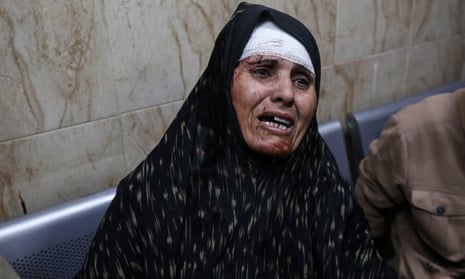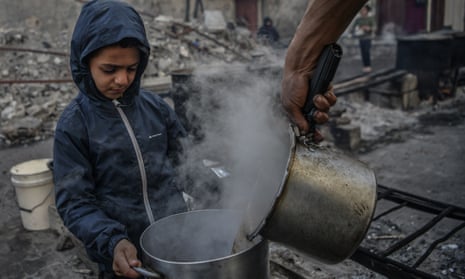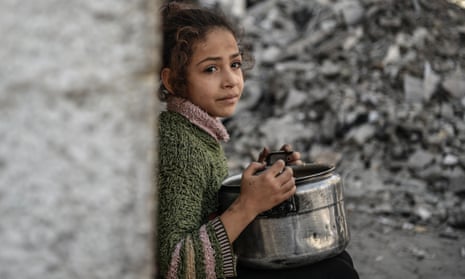Biden says he didn’t request a ceasefire in Netanyahu call
Joe Biden spoke with Benjamin Netanyahu on Saturday, calling it a long and private conversation a day after the Biden administration again shielded Israel in the diplomatic arena, news agencies report.
On Friday, the UN security council adopted a watered-down resolution that calls for immediately speeding up aid deliveries to desperate civilians in Gaza, but not for a ceasefire.
According to Netanyahu’s office, Netanyahu voiced appreciation towards the US for its stance at the UN security council. Netanyahu’s office also added that he “made clear that Israel will pursue the war until all of its objectives are fully met”.
Biden and Netanyahu talked in detail about Israeli’s military operations in Gaza including “its objectives and phasing”, the need to protect civilian lives and securing the release of hostages being held captive, the White House said, according to Reuters.
“The leaders discussed the importance of securing the release of all remaining hostages,” the White House said.
Biden declined to detail his conversation with Netanyahu, telling reporters it was a “private conversation”.
But, he added: “I did not ask for a ceasefire.”
Key events
Israel bombed areas of Jabalia in the northern Gaza Strip overnight, with fighting throughout Sunday morning, residents and Palestinian media have said.
Jabalia residents reported persistent aerial bombardment and shelling from Israeli tanks, which they said had moved further into the town on Saturday, according to Reuters.
The UN high commissioner for refugees, Filippo Grandi, has said a “humanitarian ceasefire” is the only way to ensure aid reaches civilians in Gaza, hostages are released and to stop the “devastating loss of lives”.
For aid to reach people in need, hostages to be released, more displacement to be avoided and above all the devastating loss of lives to stop a humanitarian ceasefire in Gaza is the only way forward.
War defies logic and humanity and prepares a future of more hatred, less peace.
— Filippo Grandi (@FilippoGrandi) December 24, 2023
The death toll from Israeli strikes inside Gaza has climbed to 20,258, the majority of them women and children, said the health authorities on Saturday.
On Friday, the UN security council voted for a resolution calling for large-scale delivery of aid to Gaza, but the resolution did not demand a suspension of hostilities.
Instead, it appealed only for the creation of “conditions for a sustainable cessation of hostilities”.
The UN’s secretary general, António Guterres, has warned that getting more supplies across the border into Gaza is just the first step towards staving off the imminent threat of famine and deadly epidemics.
Nearly 80% of Gaza’s 2.4 million population has been displaced by the fighting, according to UN estimates.
Many from the north have fled to the south, only to be caught up in the war for a second time.
Israel’s prime minister, Benjamin Netanyahu, has vowed the war will continue until Hamas is “destroyed”, defying growing international demands for a ceasefire.
These are now coming even from close allies such as the UK and Germany, which are concerned about the civilian toll of Israel’s offensive.
Israeli army indicates its forces are close to having operational control in north Gaza
Jonathan Conricus, an Israeli military spokesperson, has indicated that forces were close to having operational control in north Gaza, AFP reports.
Now, he said, “we focus our efforts against Hamas in southern Gaza”.
Signalling a pivot after weeks of intensive fighting around Gaza City, the Israeli army said troops were now looking to Khan Younis and elsewhere in the south.
A socially conservative city, Khan Younis – even before the wars that have engulfed Gaza since 2008 – was long regarded as a stronghold of political support for Hamas.
Israeli military says 13 Israeli soldiers killed in combat in the Gaza Strip on Friday and Saturday
The Israeli military has said 13 Israeli soldiers were killed in combat on Friday and Saturday, bringing the total number of Israeli soldiers killed since the ground offensive began in Gaza to 152, the Associated Press reports.
The 13 Israeli soldiers were reported to have been killed on Friday and Saturday in battles in central and southern Gaza.
The UN’s Special Rapporteur on the right to adequate housing, Balakrishnan Rajagopal, who has been monitoring the destruction of civilian housing and infrastructure in Gaza, wrote on X:
What has happened in Gaza is the result of what I call ‘institutionalized impunity’. Impunity for occupation. For a war of extermination. Genocide, war crimes and crimes against humanity.
What has happened in Gaza is the result of what I call ‘institutionalized impunity’. Impunity for occupation. For a war of extermination. Genocide, war crimes and crimes against humanity. If the ICC does not act very soon, we need a special tribunal for Gaza and action by States.
— UN Special Rapporteur on the right to housing (@adequatehousing) December 23, 2023
Here are some of the latest photos from news agencies coming in:




The United States shot down four drones headed towards a US destroyer in the southern Red Sea and launched from Houthi-controlled areas of Yemen on Saturday, US Central Command (Centcom) said.
“These attacks represent the 14th and 15th attacks on commercial shipping by Houthi militants since Oct. 17,” Centcom said in a post on X, formerly Twitter.
The Iran-aligned Houthis, who control much of Yemen, have disrupted world trade for weeks with attacks on ships passing through the Bab al-Mandab Strait at the southern end of the Red Sea in what they say is a response to Israel’s war in Gaza.
Read our full story here:
Israeli strikes in Gaza killed more than 200 people in 24 hours, Hamas-controlled authorities said earlier Saturday.
Fighting is now centred on Gaza City and the southern city of Khan Yunis, both considered strongholds of the Palestinian militant group that carried out bloody October 7 raids into Israel, according to Agence France-Presse. After reports of heavy Israeli shelling, grey and black smoke rose over the north of the coastal territory and in Khan Yunis.
Biden says he didn’t request a ceasefire in Netanyahu call
Joe Biden spoke with Benjamin Netanyahu on Saturday, calling it a long and private conversation a day after the Biden administration again shielded Israel in the diplomatic arena, news agencies report.
On Friday, the UN security council adopted a watered-down resolution that calls for immediately speeding up aid deliveries to desperate civilians in Gaza, but not for a ceasefire.
According to Netanyahu’s office, Netanyahu voiced appreciation towards the US for its stance at the UN security council. Netanyahu’s office also added that he “made clear that Israel will pursue the war until all of its objectives are fully met”.
Biden and Netanyahu talked in detail about Israeli’s military operations in Gaza including “its objectives and phasing”, the need to protect civilian lives and securing the release of hostages being held captive, the White House said, according to Reuters.
“The leaders discussed the importance of securing the release of all remaining hostages,” the White House said.
Biden declined to detail his conversation with Netanyahu, telling reporters it was a “private conversation”.
But, he added: “I did not ask for a ceasefire.”
Opening summary
Welcome back to our live coverage of the Israel-Gaza war. It’s nearing 9am in Gaza City and Tel Aviv on this 24 December. I’m Christine Kearney and here’s an overview of the latest to bring you up to speed.
Joe Biden discussed Gaza with Israeli prime minister Benjamin Netanyahu on Saturday, the White House said.
Biden declined to detail his conversation with Netanyahu, telling reporters it was a “private conversation”. Israel’s main ally has kept up its support while expressing concern over the growing casualty toll and humanitarian crisis in Gaza.
But, he added: “I did not ask for a ceasefire.”
Meanwhile, the Israeli military said on Sunday eight soldiers had been killed in the Gaza Strip, bringing to 154 its published combat losses since ground incursions began on 20 October, Reuters reports.
More on those stories soon, but first a recap of the other key developments.
-
A shortage in fuel, power, medical supplies and health specialists as a result of Israel’s attacks across Gaza has left al-Ahli hospital’s emergency care and surgical services “paralyzed”, the World Health Organization said. “Al Ahli is a shell of a hospital … There are no operating theaters any more due to the lack of fuel, power, medical supplies and health workers,” Richard Peeperkorn, the WHO’s Palestine representative, said.
-
Water and sanitation services in Gaza are at the point of collapse, Unicef said on Saturday. Amid Israel’s deadly attacks across the strip, which have killed more than 20,000 Palestinians and displaced nearly 2 million survivors, Unicef said that the deteriorating humanitarian situation is raising the risk of large-scale disease outbreaks.
-
The UN secretary general has warned that the scale of death and destruction inside Gaza is blocking delivery of desperately needed aid. On Saturday, Hamas also claimed that an Israeli military airstrike might have killed five hostages.
-
Two Qatari Armed Forces aircraft carrying aid for Palestinians displaced by Israeli strikes in Gaza has headed to El Arish, Egypt. In an announcement on Saturday, Qatar’s foreign ministry said that the two aircraft carrying 33 tons of aid consisting of food and medical supplies are en route to Gaza.

-
“We are not getting the humanitarian supplies that we need to cater and respond to a humanitarian crisis this size and this scale,” UNRWA spokesperson Juliette Touma has said. Speaking to CGTN, Touma added: “The more that we have these evacuation orders that the Israeli authorities continue to issue … we will see an exodus of people continue to search for safety, search for shelter.”
-
The director of UNRWA affairs, Thomas White, reiterated the absence of safety across the Gaza Strip as more than 1.9 million Palestinians remain displaced as a result of Israel’s attacks. In a tweet on Saturday, White wrote: “People in Gaza are people. They are not pieces on a checkerboard – many have already been displaced several times. The Israeli Army just orders people to move into areas where there are ongoing airstrikes. No place is safe, nowhere to go.”
-
In response to the UN security council’s passage of a resolution on Gaza aid delivery, Médecins Sans Frontières said that it “falls painfully short of what is required to address the crisis in Gaza”. In a series of tweets on Saturday, MSF said: “The watered-down resolution on #Gaza will not ensure the massive scale-up and rapid flow of humanitarian aid needed, as bombs continue to rain down on Palestinian civilians, force mass displacement, and deny access to vital medical care and humanitarian assistance.”





